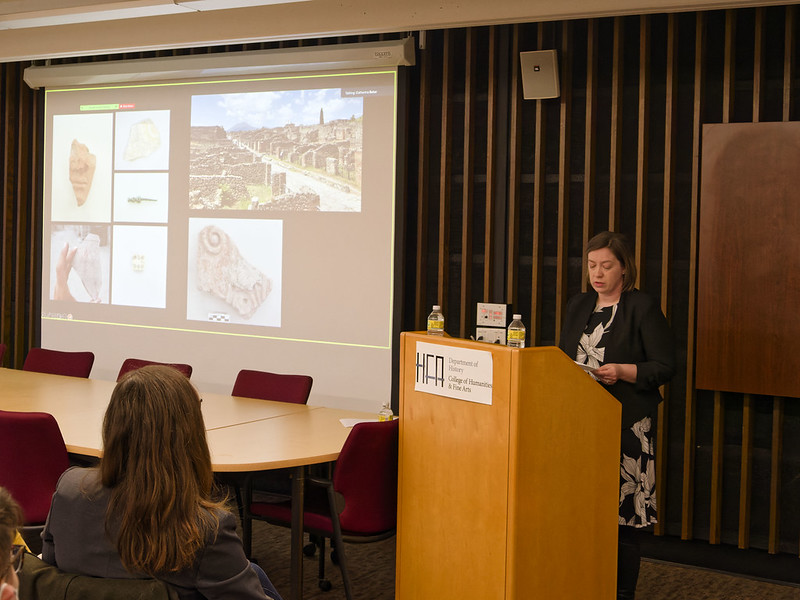On Feb. 13, the University of Massachusetts Classics Department hosted the lecture, “Artifacts and Archaeological Processes: The Lives and Afterlives of Objects at Pompeii.” Dr. Catherine Baker, a classics faculty member at Mount Holyoke College, was the guest lecturer. Baker examined objects excavated in Pompeii and discussed ways in which people used those objects and the ways the objects were recycled.
Baker began her talk by detailing lecture, which would explore several artifacts excavated by the Pompeii Archaeological Research Project: Porta Stabia (PARP: PS), a program that Baker took part in.
The PARP: PS excavation project focuses on sub-elite neighborhoods in Pompeii. Their main project goal is to understand how the varying economic statuses of Pompeii neighborhoods affected relationships between civilians and the city over time.
“These [archaeological] objects tell a story,” Baker said. She told the audience about Porta Stabia, a Pompeii neighborhood, that she and the PARP: PS team were excavating. “[Porta Stabia is] a neighborhood on the edge of the city,” Baker said. Due to its’ location, the neighborhood relied on retail commerce from those entering and leaving Pompeii.
Baker detailed the objects that were excavated in Porta Stabia. She showed the audience images of nails, statuettes and gaming items such as dice. “[I want to ask us] to think about these objects not as objects alone, but as a complex crossroads,” Baker said.
After showing the artifacts, Baker discussed how they could be categorized. Instead of categorizing objects by material or location, Baker categorized them by function. “Could we see patterns [in object purpose]? How did individual objects or classes reflect more general patterns of object deposition … with these flexible frameworks in place, [we] could start to ask bigger questions,” Baker said.
She concluded by emphasizing the importance of a holistic approach towards archaeology. “When you focus on, or fetishize, artifacts as individual items instead of their whole lives, [we] run the risk of losing the bigger, and arguably more interesting, picture … of how these objects are a part of a network of human decisions and interactions,” Baker said.
The event was organized by the Western Massachusetts chapter of the Archaeological Institute of America (WMSAIA). Shannon Hogue, an assistant professor of classics at UMass and president of the WMSAIA, learned that the chapter had received the Ellen and Charles S. La Follette Local Lecture Grant, she used the funding for the Feb. 13 lecture.
“I suggested we invite a local scholar … since [Baker] was visiting in the area and does some really amazing work at Pompeii, I thought it would be a great opportunity for us to host her and hear about her current work,” Hogue said.
Simon Oswald, assistant professor of classics at UMass and vice president of the WMSAIA, explained the purpose of the regional chapter. “[The WMSAIA] is our local branch of the much larger North American organization, established with the aim of connecting all people with any interest in archaeology at a range of sponsored yearly events,” Oswald said, “[In general, we try] to make people as enthusiastic about the discipline as we are.”
The WMSAIA has an upcoming lecture in the spring.
“This year, Professor Brian Rose of UPenn will deliver a lecture entitled ‘Archaeology, Museums, and War’ … it promises to be a fantastic event and we are very fortunate that Professor Rose, who is in high demand as a speaker throughout North America, Europe and beyond, so willingly agreed to come to western Massachusetts to speak to us,” Oswald said.
Mia Vittimberga can be reached at [email protected] and followed on Twitter @MiaVittimberga.



















